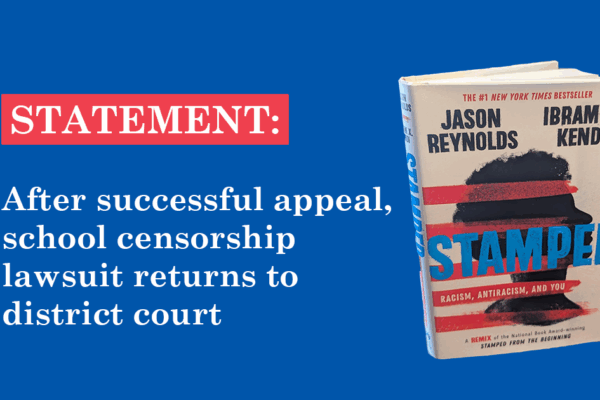A federal appeals court has re-opened the possibility that a judge might strike down the Pickens School District’s politically and racially motivated book ban. On Wednesday in the case NAACP v. Pickens County School District, the appellate court granted the plaintiffs’ request to vacate the lower court’s denial of a preliminary injunction.
The case involves the Upstate school district’s September 2022 decision to remove Ibram X. Kendi and Jason Reynolds’ book Stamped: Racism, Antiracism, and You from every classroom, library, and media center in the District for 5 years.
The ACLU of South Carolina and the NAACP’s Office of General Counsel represents the plaintiffs in the lawsuit. This spring, Pickens County families and the county branch of the NAACP sought an injunction that would have forced the district to return Stamped to classrooms and libraries in time for the start of the 2023-24 school year.
On July 21, a U.S. District Court judge in South Carolina denied the motion for a preliminary injunction with little explanation. On October 11, the U.S. Court of Appeals for the Fourth Circuit granted Plaintiffs’ motion, summarily vacated the lower court’s ruling, and remanded the case. On remand, the U.S. District Court judge is required to issue a new order and to adequately explain its factual findings and legal analysis.
We and our clients believe that the Pickens County School Board engaged in politically and racially motivated censorship that cannot be tolerated under the First Amendment. As we show in an interactive map on our website, the incident is just one of the numerous book bans and challenges that have taken place in at least 12 counties across South Carolina since 2020.
“The District’s groundless censorship of Stamped makes a mockery of the Constitution and models dangerous, anti-American authoritarianism to its student body,” said Allen Chaney, ACLU of South Carolina Legal Director. “The health of our pluralistic society requires public schools to incubate critical thinking, tolerance, and respectful disagreement — this current wave of school-based censorship undermines democracy and pushes us further into cynicism, distrust, and intransigence.”
“Black history is American history. We have a responsibility to provide our students with a complete teaching of our nation’s history — both the good and the bad,” said NAACP Pickens County Branch President Shelia Crawford. “In a state like South Carolina, where the legacy of slavery and systemic racism runs deep, any effort to rewrite our history is a clear attempt to send our society backwards. We stand resolute in our refusal to do so. The Pickens County School Board’s decision to ban Stamped from the public school curriculum is a disservice to all of our students. The Pickens County NAACP remains committed to preserving an inclusive curriculum that celebrates diversity, advances equity, and continues the pursuit of justice for Black America.”
“One thing is clear — Black history is under attack in Pickens County,” said Janette McCarthy-Wallace, NAACP General Counsel. “The NAACP has, and will continue to stand in solidarity with our Pickens County Branch as we fight for our constitutional rights. We are committed to the pursuit of all legal pathways that uphold educational rights and preserve the crucial inclusion of rich Black storytelling in comprehensive curricula. Our advocacy for justice and the protection of education in America remains stronger than ever.”
The lawsuit is ongoing. Beyond the request for injunction, it asks that the court declare that removing Stamped was unconstitutional and order that all copies of the previously removed book be returned and barred from being removed from classrooms, libraries, and media centers again.
###
Additional resources
Banned in South Carolina: An interactive map of book bans and challenges
April 2023 press release announcing the lawsuit: New Lawsuit Alleges Pickens County School Board Book Ban is Unconstitutional and Politically Motivated
Via the NAACP: Book Bans: An Act of Policy Violence Promoting Anti-Blackness
Stay Informed
Sign up to be the first to hear about how to take action.
By completing this form, I agree to receive occasional emails per the terms of the ACLU’s privacy statement.
By completing this form, I agree to receive occasional emails per the terms of the ACLU’s privacy statement.


